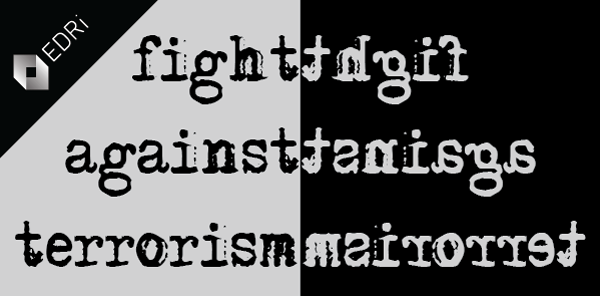Can we ensure EU terrorism policies respect human rights?
During 2017, the European Union (EU) increased its arsenal its “fight against terrorism”, namely by adopting a Directive on combating terrorism and by setting up a Special Committee in the European Parliament. In partnership with the Open Society European Policy Institute (OSEPI), the European Network Against Racism (ENAR), Amnesty International, Human Rights Watch and the International Court of Justice (ICJ), EDRi has been working to ensure that the EU and its Member States do not restrict fundamental rights and freedoms when developing, transposing and implementing EU counter-terrorism policies, in particular the EU Terrorism Directive.
The Terrorism Directive was formally adopted on 15 March 2017, and Member States are expected to transpose it into their national legal systems by 8 September 2018. EDRi identified various sources of concern deriving from the text, but also some positive aspects.
On the negative side, the Directive uses unclear wording when defining terrorist offences, which could lead to abusive practices by national authorities. In addition, it says that consulting terrorist websites can be a terrorist crime. This is particularly interesting because the French Constitutional court ruled unconstitutional a similar provision in two occasions, most recently on 15 December 2017.
On the positive side, the Terrorism Directive offers Member States the opportunity to ensure more legal predictability and put an end to practices leading to unnecessary and disproportionate restrictions of fundamental rights, such as freedom of expression and opinion, privacy and non-discrimination. For instance, the Directive is clear that “the expression of radical, polemical or controversial views in the public debate” is excluded from the scope of application, and that “the notion of intention must apply to all the elements constituting [criminal] offences”. If the Directive was duly transposed and implemented in this regard, some mistakes made in the past would not be made in the future. As one example, the Spanish rapper César Strawberry would not have been condemned to prison for posting six tweets, as the Court would have had to consider whether he actually had the intention to commit a terrorist act.
Along with Amnesty International, ENAR, OSEPI, Human Rights Watch and ICJ, EDRi is participating in workshops organised by the European Commission with representatives from EU Member States to discuss the transposition and implementation of the Terrorism Directive. These workshops do not guarantee that the Member States’ national counter-terrorism legislations and policies will be human rights-compliant, in line with their obligations both under the Directive and the EU Charter of Fundamental Rights. However, we welcome this rare opportunity to raise awareness of human rights violations detected in several EU Member States and provide recommendations and legislative advice to countries’ representatives and the Commission itself.
By 8 March 2020, the Commission will have to produce a report to assess the completeness and the compliance of national rules with the EU Terrorism Directive. As advocated by EDRi, the Commission will also have to produce a report to assess the impact of this Directive on non-discrimination, fundamental rights and freedoms and the rule of law by 9 September 2021. For this, the Commission and the Member States will have to rigorously gather the necessary data, and they could make available streams of funding for NGOs to help with this an arduous job. We hope that the positive work of the Commission in facilitating our input in the transposition process presages a more timely and thorough report than it provided in the case of the data retention Directive (seven months late) and the child exploitation Directive (one year late).

Terrorism Directive: Document pool
https://edri.org/terrorism-directive-document-pool/
EU Directive on combating terrorism (15.03.2017)
http://eur-lex.europa.eu/legal-content/EN/TXT/?uri=celex:32017L0541
(Contribution by Ana Ollo, EDRi intern)


